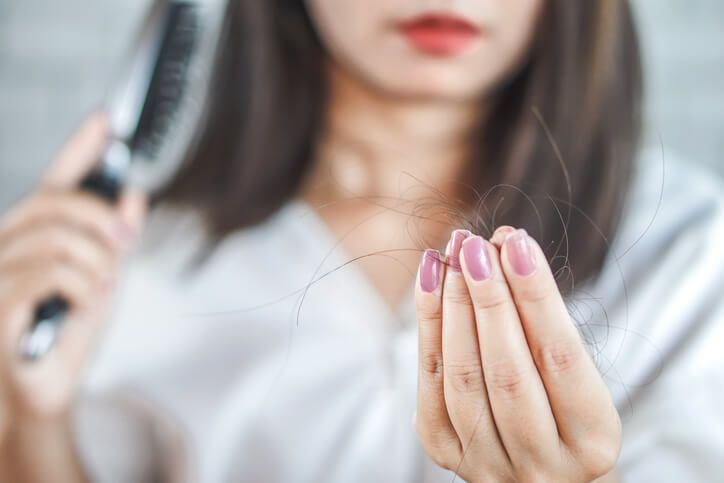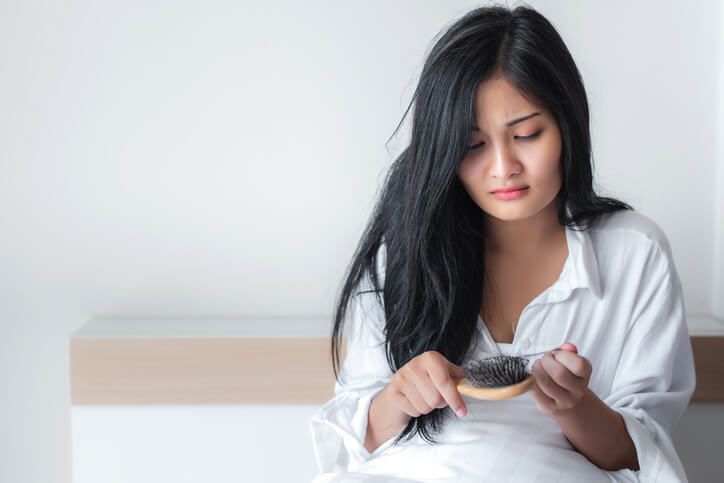
- Home
- Trend
- Weight Loss Strategies
- Acne Tips
- Hair Health Information
- Blemish Removal Tips
- Acne Scar Removal Tips
- Muscle Building Techniques
- Intimate Care Tips
- Postpartum Intimate Care
- Eye Bags Wiki
- Tips for Face Slimming
- Secret of Permanent Hair Removal
- Breast Enlargement Tips
- Cure to Snoring
- Marionette Lines
- Skin-Tightening Secrets
Postpartum hair loss is a common issue many women face. From pregnancy to giving birth, a woman’s body undergoes significant changes. After childbirth, mothers must deal with a changing body, sagging skin, the stress of breastfeeding, and, in some cases, postpartum hair loss. Watching your hair thinning out more and more can be frustrating for any new mother. So, why does postpartum hair loss happen? And how can it be prevented or improved? If you're currently dealing with this issue, don’t miss out on this article! Below, we’ll recommend some food remedies and tips to help improve postpartum hair loss. Keep reading!
Understanding Postpartum Hair Loss – The Hair Growth Cycle

Before diving into the specifics of postpartum hair loss, let’s first understand the hair growth cycle. For a healthy woman, it’s normal to shed 80 to 100 strands of hair a day. However, for postpartum women, various factors can significantly increase hair loss.
A woman’s hair growth cycle consists of three stages: the anagen (growth) phase, the telogen (resting) phase, and the exogen (shedding) phase. During pregnancy, hormone levels, particularly estrogen and progesterone, rise significantly, which prolongs the growth phase of the hair cycle. As a result, many pregnant women notice their hair feels fuller, stronger, and healthier.
However, after childbirth, estrogen and progesterone levels return to normal, causing the hair that was in the growth phase to quickly transition into the shedding phase. This is why postpartum hair loss occurs, and it’s often more noticeable than regular shedding.
Causes of Postpartum Hair Loss

Why does postpartum hair loss happen? Unlike regular hair loss, postpartum hair loss is closely tied to changes in hormones, stress, and emotional health.
Cause 1: Hormonal Changes After Childbirth
During pregnancy, a woman’s body experiences a surge in pregnancy hormones, which speeds up hair growth. After delivery, these hormone levels drop, and hair enters the shedding phase. This leads to significant hair loss.
Cause 2: Blood and Qi Deficiency
From a traditional Chinese medicine perspective, "hair is the surplus of blood." When the body’s blood and qi are sufficient, hair naturally gets the nutrients it needs. However, during pregnancy, a woman’s body provides nutrients to the fetus, and childbirth—whether vaginal or cesarean—can result in significant blood loss. Additionally, breastfeeding further depletes a woman’s blood and energy, leading to blood and qi deficiency, which contributes to postpartum hair loss.
Cause 3: Personal Hygiene Habits
In today’s society, many people still follow the tradition of "sitting the month," where women avoid washing their hair during the first month postpartum to prevent cold and wind exposure. However, this can lead to an overproduction of oil on the scalp, blocking hair follicles and preventing hair from receiving the nutrients it needs, which increases the likelihood of hair loss.
Cause 4: Stress
New mothers face immense stress after childbirth, especially if they lack support at home. Caring for a newborn who wakes up multiple times a night to breastfeed leaves little time for sleep. The stress of caring for a baby can contribute to postpartum hair loss.
免費體驗
F8 Hair Regrowth Treatment
1 Minute Self-Registration
Date should not be before minimal date
How Long Does Postpartum Hair Loss Last?
Studies show that about 40% of women experience some degree of hair loss postpartum, typically lasting between 2 to 6 months after delivery. This is a temporary shedding phase triggered by the drop in estrogen levels, causing hair that was in the growth phase to enter the resting or shedding phase.
However, for most women, postpartum hair loss will improve after about 6 months, and hair will start to grow back naturally. If hair loss persists and worsens—shedding more than 100 hairs a day—it’s advisable to consult a doctor to check for underlying issues like anemia or thyroid imbalances.
4 Ways to Improve Postpartum Hair Loss
Noticing your hair thinning on top? Seeing clumps of hair fall out every time you wash your hair? If you want to prevent postpartum hair loss from worsening, focus on these 4 points after giving birth, which can significantly reduce the chances of hair loss!
1. Maintain a Good Diet
Hair is mainly composed of a substance called keratin. To avoid postpartum hair loss, it’s important to maintain a healthy diet with balanced nutrition. Eat plenty of fresh fruits, vegetables, legumes, and eggs. Additionally, expecting mothers should consume foods rich in protein, such as eggs, milk, and chicken, to ensure their bodies get the necessary nutrients, which will help hair become stronger and less likely to fall out. This aids in improving postpartum hair loss.
2. Avoid Chemical Stimulation
During postpartum hair loss, try to avoid any chemical treatments. Some women may dye their hair to visually cover the thinning, but this can actually damage hair further. After giving birth, hair is more fragile, and using chemical treatments like perms can cause more hair to fall out. Therefore, avoid chemical treatments for at least six months post-birth.
3. Wash Hair Properly
Don’t avoid washing your hair out of fear that it will fall out. Some may follow traditional customs and avoid washing their hair for 30 days during confinement, but this can block pores with oil and worsen hair loss. If you're concerned about cold air entering while washing your hair during confinement, you can use ginger water to wash your hair, which helps expel cold. Also, the frequency of washing doesn’t affect hair loss. Properly washing your scalp helps open pores, allowing your hair to absorb nutrients and reducing hair fall.
4. Get Sufficient Sleep
Sleep quality also affects hair loss. Lack of sleep weakens your energy and increases stress, which can weaken your immune system and disrupt hormonal balance. Also, staying up late regularly depletes liver blood, making it harder for your hair to get enough nutrients, leading to postpartum hair loss.
What Foods Can Help with Postpartum Hair Loss?
Women often lose a lot of blood during childbirth, and the constant care of a newborn may lead to poor nutrition intake and increased stress, which could contribute to postpartum hair loss. In addition to the lifestyle changes mentioned earlier, eating certain foods can also promote hair growth.
1. Black Beans
Black beans are rich in plant-based protein, which is a key component in hair structure. They also contain various trace elements like iron and zinc, which can reduce hair loss and promote hair growth.
2. Black Sesame Seeds
Black sesame seeds are often called the "holy grail for hair," as they help increase melanin production, promoting hair growth. They also contain trace elements such as iron, dietary fiber, vitamin E, and calcium, which help produce healthy red blood cells to deliver oxygen and nutrients to the scalp. With sufficient nourishment, the hair will be less likely to fall due to dryness.
3. Walnuts
Walnuts are rich in unsaturated fatty acids, B vitamins, and vitamin E. Eating them can keep hair shiny and strong, boost metabolism, and improve the health of hair follicles. Walnuts also have antioxidant properties that protect hair cells from damage caused by UV rays, helping to improve postpartum hair loss.
4. Spinach
Among green vegetables, spinach has the highest nutritional value. It contains iron, vitamin A, vitamin C, and folic acid, all of which contribute to hair growth. Vitamin A helps produce beneficial oils for the scalp, while iron helps red blood cells carry oxygen to the scalp, providing hair with essential nutrients and reducing the chance of postpartum hair loss.
免費體驗
F8 Hair Regrowth Treatment
1 Minute Self-Registration
Date should not be before minimal date
What Does Traditional Chinese Medicine Say About Postpartum Hair Loss?
Many women combine both Western and Chinese medicine to treat postpartum hair loss. From a Chinese medicine perspective, postpartum hair loss occurs due to the depletion of vital energy (Qi) and kidney essence during pregnancy and childbirth. Combined with insufficient rest while caring for a newborn, this continuous depletion leads to a weakened liver and kidney. Additionally, as "hair is the surplus of blood," insufficient blood flow means that essential nutrients can't reach the scalp, causing postpartum hair loss to persist.
To treat this, Chinese medicine practitioners usually conduct a diagnosis and provide personalized treatments, including internal Chinese herbal remedies and dietary recommendations. Acupuncture and topical herbal powders may also be used to directly stimulate hair follicles and promote hair growth.
Recommended Chinese Herbal Remedies for Postpartum Hair Loss
In addition to improving lifestyle habits, Chinese herbal remedies can be effective in promoting hair growth. Here are three easy-to-make remedies:
1. Angelica and Ejiao Blood Nourishing Soup
Angelica and Ejiao are excellent herbs for women, as they nourish Qi, blood, and kidneys, and stimulate hair growth. Cleanse lean meat, angelica, white peony root, cooked rehmannia, and fleeceflower root. Break Ejiao into pieces and set aside. Soak the herbs in 6-8 bowls of water for 30 minutes, bring to a boil, then add Ejiao and lean pork. Simmer for 1.5 hours before drinking.
2. Mulberry and Goji Kidney Tonifying Hair Growth Soup
Mulberry nourishes liver blood and strengthens kidney Yin, while Goji berries nourish blood and supplement the kidneys. This soup is especially beneficial for women who lost a lot of blood during childbirth. Cleanse the herbs—mulberry, privet fruit, Eclipta, Polygonatum, Goji berries, dried tangerine peel, walnuts, and lean pork—then add them to 6-8 bowls of water. Boil for 1.5 hours before drinking.
3. Fleeceflower Root and Egg Soup
Fleeceflower root is a common herb for hair growth. It nourishes essence, blood, and kidney, helping darken hair. To prepare, wash the materials and cook two eggs in their shells with fleeceflower root for an hour. Drink both the eggs and the soup, once a day for three consecutive days.
Don’t Delay Treating Postpartum Hair Loss! Early Treatment is Key! Recommended: Perfect Medical F8 Hair Regrowth Treatment
If you don't want postpartum hair loss to turn into baldness, don’t wait! If you've tried various methods and hair growth shampoos with no improvement, it's time to let professionals save your hairline! For moms looking for quick improvement, the Perfect Medical F8 Hair Regrowth Treatment is a great choice!
Perfect Medical F8 Women's Hair Growth Treatment uses medical-grade soft laser to penetrate the hair follicles, directly stimulating melanocytes at the root. This activates hair follicles and promotes scalp blood circulation, improving follicle health and stimulating hair growth, leading to thicker, fuller hair!
The treatment follows three key concepts: "Nourish Hair, Revive Hair, Grow Hair!" First, the "Nourish Hair" step deeply cleanses pores and scalp, removing dead skin and chemical residues. Next, the "Protect Hair" stage uses medical laser therapy to introduce potent hair nourishment factors, accelerating cell renewal, and revitalizing hair follicles. Finally, the "Grow Hair" phase uses powerful growth serums to activate stem cells beneath the scalp, regenerating blood vessels and cells, leading to new cell formation and rejuvenating scalp skin for healthier hair.
Unlike hair transplant surgeries that require recovery time, the F8 treatment is non-invasive, completely safe, and pain-free. With no downtime, you can resume your normal life immediately. Perfect for busy urban women!
Currently, Perfect Medical is offering a free trial! Sign up through the link below to experience this quality hair growth treatment!
Sign Up Now: Perfect Medical F8 Hair Regrowth Treatment免費體驗
F8 Hair Regrowth Treatment
1 Minute Self-Registration
Date should not be before minimal date
FAQ

When will postpartum hair loss stop?
Women may experience varying degrees of hair loss postpartum, and this condition typically lasts from 2 to 6 months after delivery, with a temporary shedding phase. The cause is the return of estrogen levels to normal, which causes hair that was in the growth phase to shift to the resting or shedding phase. However, most postpartum hair loss improves after six months, and hair will gradually grow back. Mothers need not worry too much. If hair loss continues and worsens, with more than 100 hairs shedding daily, it is advisable to consult a doctor to check for issues such as anemia or thyroid imbalance.
How can postpartum hair loss be improved?
First, maintain a healthy diet with balanced nutrition, including plenty of fresh vegetables, fruits, beans, and eggs. Additionally, consume protein-rich foods such as eggs, milk, and chicken to ensure adequate nutrition for the body. This helps strengthen the hair and prevent excessive shedding, thus improving postpartum hair loss. It is also essential to avoid chemical treatments during the postpartum period. After delivery, hair is more fragile, and chemical treatments like perms or coloring could cause additional hair loss. Therefore, reduce hair treatments in the first six months postpartum. Moreover, avoid traditional practices like not washing hair for 30 days during the confinement period, as this can clog hair follicles and worsen hair loss. If new mothers are concerned about cold air entering the body while washing their hair, using ginger water to bathe can help remove coldness. In fact, hair loss is unrelated to how often you wash your hair. Regularly cleansing the scalp keeps the hair follicles clear, ensuring that hair gets enough nutrients and is less prone to shedding. Finally, get adequate sleep; when sleep is insufficient, hair naturally does not receive the nutrition it needs, leading to postpartum hair loss.
What are some recommended food remedies for postpartum hair loss?
We recommend mulberry root bark and Chinese yam soup, and Polygonum multiflorum egg soup. Mulberry root bark nourishes the liver, replenishes kidney essence, and wolfberries help nourish the blood and kidneys. This soup is particularly helpful for women who experience excessive blood loss postpartum and is also suitable for those with blood deficiency. As for Polygonum multiflorum, it is a common herb used to promote hair growth, replenish vital essence and blood, and strengthen hair. The preparation is simple: clean the ingredients, place them in a pot with water, and cook two eggs with Polygonum multiflorum for one hour. Then, drink the soup with the eggs, once a day for three consecutive days.
What causes postpartum hair loss?
Postpartum hair loss can be caused by hormonal changes, insufficient blood circulation, and personal hygiene habits. During pregnancy, the surge of pregnancy hormones accelerates hair growth. However, after delivery, estrogen levels return to normal, and hair enters the shedding phase. Additionally, both vaginal and cesarean deliveries result in blood loss, and breastfeeding also contributes to the depletion of blood and energy. With insufficient blood to nourish the hair, postpartum hair loss can occur. Furthermore, some women follow traditional practices during the confinement period by not washing their hair for several days to avoid cold or wind. However, this can lead to excessive oil secretion on the scalp, which blocks hair follicles, and combined with dust, makes it harder for the hair to receive nutrients, thereby increasing the likelihood of postpartum hair loss.
What are some recommended treatments for improving postpartum hair loss?
The Perfect Medical F8 Women’s Hair Growth Treatment uses medical-grade soft lasers to penetrate the hair follicles, reaching the roots where melanin absorbs the laser energy. This activates the hair follicles, promoting scalp blood circulation and increasing ATP synthesis, improving follicle and dermal papilla health, and stimulating hair regrowth. The treatment focuses on three key concepts: nourishing, activating, and regrowing. First, it nourishes the hair by deeply cleansing the pores and scalp, removing dead skin cells and chemical residues. Next, it protects the hair through medical laser treatment, introducing powerful hair nourishment factors to accelerate cell renewal, restoring follicle health and vitality. Finally, regrowth is achieved through a potent hair growth serum that activates the stem cells at the base of the scalp, promoting the regeneration of scalp cells and blood vessels, leading to the creation of new cells and rebuilding strong, healthy skin. This comprehensive approach improves scalp health and effectively addresses postpartum hair loss.








